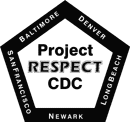|
 Introduction Introduction
Project RESPECT was a national study evaluating the efficacy of HIV prevention counseling in
changing high risk sexual behaviors and preventing new sexually transmitted diseases (STDs)
and HIV. The project concluded with a large, multi-center randomized, controlled trial that
compared two different brief, one-on-one counseling interventions and an informational messages
intervention that is more typical of current practice.
The trial enrolled men and women who came for diagnosis and treatment of an STD to one of
5 publicly funded STD clinics across the United States.

All participants agreed to have an HIV test and to come back to the clinics every 3 months for a full year
to undergo behavioral questionnaires, STD examinations and tests, and HIV tests.
Over the 6 year project, 5,876 men and women with predominantly heterosexual HIV and STD risk
enrolled in the study and were randomized to one of three HIV prevention interventions, either
Enhanced Counseling (4 interactive counseling sessions based on theories of behavioral science),
Brief Counseling (4 interactive counseling sessions based on theories of behavioral science),
Brief Counseling (2 short, interactive counseling sessions based on CDC’s client-centered HIV Prevention
Counseling model), or Didactic Messages (2 short, interactive counseling sessions based on CDC’s client-centered HIV Prevention
Counseling model), or Didactic Messages (2 brief information-only sessions that are typical of what is
currently done at many test sites). For more information about the interventions, including quality
assurance protocols, please download the
Intervention Manual (2 brief information-only sessions that are typical of what is
currently done at many test sites). For more information about the interventions, including quality
assurance protocols, please download the
Intervention Manual (July 1993). (July 1993). Results
The trial found that participants in both the Enhanced Counseling and Brief Counseling interventions
reported significantly more condom use at 3 and 6 months post intervention compared with participants
in Didactic Messages. Significantly fewer participants in both the Enhanced and Brief Counseling
interventions had new STDs. After 6 months, 30% fewer participants in both counseling interventions
had new STDs, and after 12 months, 20% fewer participants in both had new STDs. The STD reduction
was similar for men and women. Subset analyses suggest that the counseling intervention were better
for adolescents (45% fewer had new STDs) and for people who had an STD at the baseline visit
(40% had new STDs).
The randomized control trial outcome results were published in
JAMA Oct 7. 1998. Other Project
RESPECT publications, including one on quality assurance, an incentives paper, two MMWRs, a condom
letter and several abstracts are also available in the
Project RESPECT Bibliography Page. Other Project
RESPECT publications, including one on quality assurance, an incentives paper, two MMWRs, a condom
letter and several abstracts are also available in the
Project RESPECT Bibliography Page.
Additional studies are underway assessing the cost effectiveness of counseling interventions,
whether a single counseling session used in conjunction with a rapid HIV test might be as effective
in preventing STDs as two sessions, and whether an additional counseling session at 6 months may
be effective.
Also visit the RESPECT-2 Web page.
|